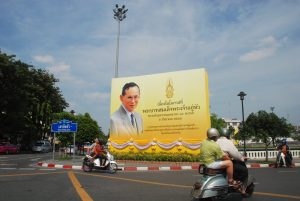As a journalist, it’s a good rule of thumb never to read too much into what is trending on Twitter at any given moment. But the social media network’s algorithms occasionally toss up something that is worth taking seriously as an indication of real-life trends.
One example is the hashtag #RepublicofThailand, which for a couple of days last week was the top trending hashtag in the Southeast Asian country. While calls for a republic are relatively tame part of the political debate in many nations (including my own country Australia), they have an incendiary edge in Thailand, where criticism of the royal family carries prison terms of up to 15 years.
The English-language #RepublicofThailand hashtag burst forth on September 24, and by the end of the following day, had featured in more than 820,000 tweets. Many of them were accompanied by memes pouring scorn on the monarchy’s immense wealth and power, and calls for democratic change – some verging on the revolutionary.
The Twitter surge came as more than a thousand pro-democracy protesters rallied outside parliament on September 24, while members gathered to decide whether to pursue constitutional reforms. Dominated by supporters of Prime Minister Chan-o-cha’s government, the parliament voted to delay until November a decision on whether to make any amendments to the charter.
The decision follows a recent wave of public protests that culminated in a huge demonstration in Bangkok on September 19. The protest leaders are pushing for changes to the current constitution, which was written by the military junta that took power after a 2014 coup, and reserves the senate for hand-picked nominees. They are also calling on the resignation of Prayut, a general who led the 2014 coup and slipped through a flawed election last year.
Most explosively, protest leaders have issued a taboo-shattering 10-point call for reforms that would curb the powers of King Maha Vajiralongkorn, who took the throne in 2016. On September 20, protesters cemented a plaque into the ground in a park in front of Bangkok’s Grand Palace, inscribed with the words, “this country belongs to the people and is not the property of the monarch as they have deceived us.” The plaque was designed to replace an old memorial to the 1932 Revolution, which ended absolute monarchy and introduced Thailand’s first constitution. The plaque, which disappeared one night in April 2017 and was soon replaced with a new plaque extolling the monarchy, has since become a symbol of opposition to the status quo.
None of the current protest leaders have yet called for the establishment of a republic; given its past association with communism, it would be seen as tantamount to a declaration of war on the ruling establishment. But according to activist and protest leader Parit “Penguin” Chiwarak, the storm of tweets containing the #RepublicofThailand hashtag was a sign of the anger that is driving the current demonstrations. “When people are desperate for reform, they’re thinking of revolution,” he told the Reuters news agency. “More desperation will lead to more aggression.”
We should always be cautious about extrapolating from online expressions of revolutionary fervor to the real world. While Thai republicanism has a long history, especially on the left side of politics, it is hard to know how widely these sentiments are shared among the Thai population, nor to what extent they will manifest in open political demands.
Still, given the difficulty of voicing any criticism of the Thai monarchy, it is hard to overestimate the significance of such calls. Since the mid-twentieth century, the Thai military and ruling elites have crafted the country’s royal family into an unchallengeable cynosure whose sacrosanct status justifies existing hierarchies of power and wealth.
With the economic aftershocks of COVID-19 now exposing the extent of the system’s inequities, and energizing a new generation of political dissidents, the powers that be may well find the anti-monarchical genie difficult to force back into the bottle.
































